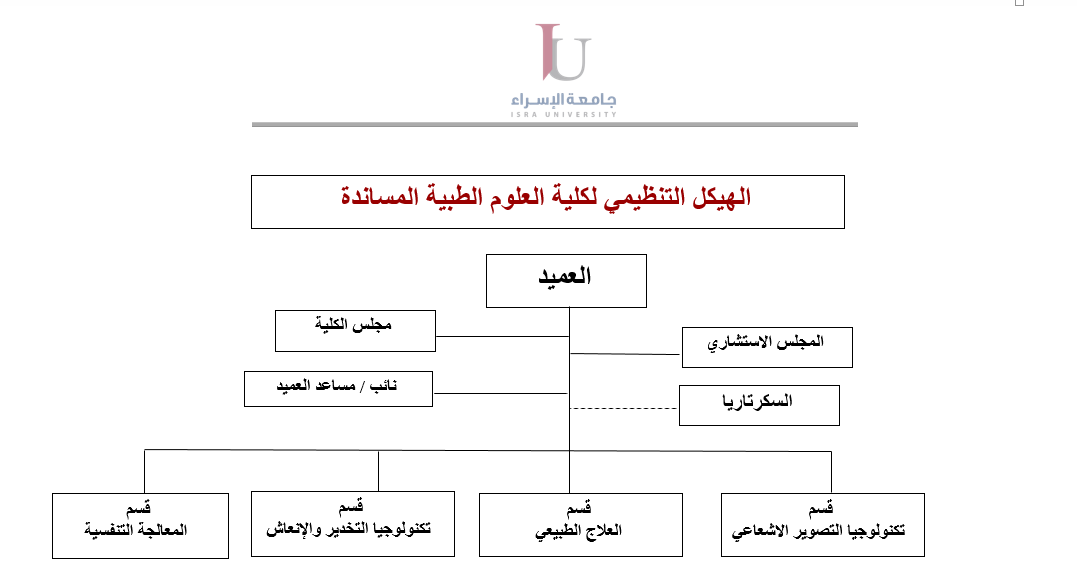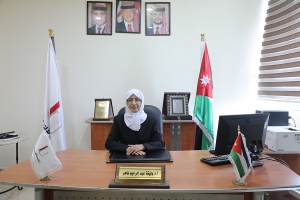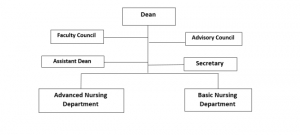كلية الصيدلة
Faculty Of Pharmacy
Vision:
Excellence in learning and teaching of Allied Medical Sciences, Research, and Community Service.
Mission:
Prepare qualified graduates in Allied Medical Sciences who possess scientific capabilities, clinical skills of international standards.
Aims:
- Acquire the skills and knowledge necessary to succeed in the Allied medical professions.
- Apply critical thinking and problem-solving in clinical cases.
- Promote scientific research for the faculty members.
- Adopt a continuing education approach in the Allied Medical Sciences.
- Instill professional ethics.
- Develop the training skills of the faculty members.
- Provide a distinguished level of academic activities and clinical training for the students.
- Encourage voluntary work in the community service.
ص.ب 33 و 22 مكتب بريد جامعة الإسراء 11622
Phone: 4711581 - 4711830 - 4711710
Ext.
Dean's Office: 2775
Secretary: 2723
Fax: 4711505
Email: This email address is being protected from spambots. You need JavaScript enabled to view it.
Dear Admitted Students,
Welcome to the Faculty of Nursing at Isra University. As part of the interdisciplinary team, we aim to graduate competent and caring nursing professionals prepared to address multiple and complex human needs in an ever-changing environment.
The Faculty of Nursing is a pioneering school in Competency-Based Education. The professional competencies stemmed from the National Competency and Standards Framework initiated by the Jordanian Nursing Council to formulate the general framework of the nursing programs at the school that is dedicated to critical thinking, continuous improvement, evidence-based practice, and leadership in an ever-changing environment.
While striving for international recognition, the Faculty is continuously engaged in initiatives with community and academic partners and partnerships and committees that involve national and international agencies and hospitals to provide students with quality clinical experiences.
The Faculty of Nursing aspires to become a leading school in nursing sciences, scientific research, and community partnership at the regional and global levels by providing recognized and unique nursing programs in conducive, student-centered, and competency-based learning environments.
Kind Regards,
Dean of Faculty of Nursing
Prof. Wafiqa abd-Al Rahim Thaher
The Faculty of Nursing, established in September 2006, is dedicated to safe, ethical practice, honesty and integrity, collaboration and teamwork, leadership and management, and scientific research. Therefore, graduating competent, caring nursing professionals prepared to address multiple and complex human needs, as part of the interdisciplinary team, in an ever-changing environment is the school's slogan.
The Faculty offers a Bachelor in Nursing program, initiated in 2006, and a Master's program in Chronic Care Nursing, established at the beginning of 2018-2019. The latter is distinctive, with 15 students enrolled in the inaugural year. These programs are accredited by Jordan's Accreditation and Quality Assurance Commission for Higher Education Institutions. International accreditation by commissions such as the Accreditation Commission for Education in Nursing (ACEN) likewise aspires.
The Faculty of Nursing is a pioneer in Competency-based Education. The professional competencies stemmed from the National Competency and Standards Framework initiated by the Jordanian Nursing Council to formulate the general framework of the nursing programs. This framework focuses on critical thinking, continuous quality improvement, evidence-based practice, and leadership in an ever-changing environment.
While striving for international recognition, the Faculty is continuously engaged in initiatives with community and academic partners and partnerships and committees that involve national and international agencies and hospitals to provide students with quality clinical experiences.
In addition to Jordanian students, alumni of the Bachelor in Nursing program are about 500 graduates from many countries, including Oman, Kuwait, Palestine, and Nigeria. The percentage of graduates who passed the licensure exam of the Jordanian Nursing Council is about 87%.
Faculty Mission
The mission of the faculty of Nursing at Isra University is to graduate a nursing staff who cares about care and can address the multiple human needs and play an active role in providing quality health care within different and changing health systems.
The faculty of Nursing is committed to creating and providing curricula and an educational environment centered around the learner and the required competencies. It also seeks to create a quality of nursing that is characterized by critical thinking, ethical practice of the profession, keenness on development and continuous self-education in addition to leadership and the ability to communicate with different groups.
Academic programs in the faculty of nursing:
- Bachelor Program in Nursing.
- Master's degree in Chronic Care Nursing.
Program Objectives:
1. Prepare graduates who possess the competencies required for safe, high-quality, and evidence-based practice.
2. Develop the graduates' ability to think critically, lead and communicate effectively within diversified and ever-changing health systems.
3. Provide contemporary educational curricula and environments centered on the learner and the required competencies.
4. Provide distinguished faculty members and researchers by executing suitable recruitment, training, and scholarship plans.
5. Promote individual, family, and community health in various health care aspects through local, regional, and international partnerships.
Faculty members:
The Faculty of Nursing has fourteen faculty members distributed among the two programs of the school and its two administrative divisions – basic and advanced-. Their qualifications are set to meet accreditation requirements according to the major nursing domains, including adult, mother, child, and community care, mental health, leadership and management, and therapeutic communication.
Divisions of the Faculty:
1. Basic Nursing Division constitutes courses and faculty members for the first- and second-year students and the Master's program. In addition, the division provides students with basic skills, knowledge, and competencies for advanced courses.
2. Advanced Nursing Division constitutes courses and faculty members for the undergraduate program's third- and fourth-year students. In addition, the division provides students with competencies needed for the care of patients in speciality units at the hospitals or the health centers.
Vision:
To become a leading school in nursing sciences, scientific research, and community partnership.
Mission:
To graduate competent nursing professionals prepared to provide comprehensive, high-quality nursing care for the clients, families, and communities as part of the interdisciplinary team in an ever-changing environment.
Core Values:
1. Pioneering
2. Transparency
3. Neutrality
4. Excellence and Creativity
5. Participation
6. Honesty
The Philosophy of the Faculty of Nursing
The philosophy of the Faculty of Nursing is consistent with that of the Ministry of Higher Education and Scientific Research (MoHESR), the Jordanian Nursing Council (JNC), and Isra University (IU). Our philosophy is founded on theories such as the "Humanistic Theory" and "Adult Learning Theory" since they aid in developing patterns that guide nursing education.
Isra University's Faculty of Nursing combines the concepts of nursing, person, health, environment, teaching, and learning in its curricula, promoting lifelong learning, empowerment, and caring.
We believe that students are recognized as whole individuals at the heart of the educational process. They have intrinsic dignity and need to be treated with respect and care. Students learn in open and adaptable systems, and they are in constant direct contact with the internal and external environments. Thus, their interdependent physical, psychological, emotional, sociocultural , spiritual, and developmental subsystems should be considered.
We believe that learning is a lifelong process that allows people to survive, mature, and achieve their personal goals. Each student has a unique learning style and particular goals and learning rates. When the ideal learning environment is provided, students can achieve their full potential.
Faculty members employ several instructional tactics to improve communication skills, feelings, critical thinking, research, artistic, and practical skills to optimize students' participation in the learning process. As a minimum requirement, faculty members give students detailed outlines. As a result, students improved their knowledge, abilities, and attitudes by using their curiosity, motivation, and newly taught talents.
The environment is critical in students' learning since it encompasses all the situations, circumstances, and influences impacting individual growth and behavior. By using diverse educational methodologies, including Concept-based Learning (CBL), Evidence-Based Practice (EBP), and the incorporation of health informatics and computer simulation, the ideal learning environment should cater to the learner's social, emotional, and cognitive requirements.
We believe that Nursing is a healthcare profession that combines the art of caring with nursing science to provide holistic, creative, and dynamic care to individuals, families, and communities. This art is delivered through the nursing process. Moreover, it is based on nursing theories and knowledge, current research evidence, client values, and nurse experiences. To promote health, manage the disease, and establish therapeutic nursing interventions, the professional nurse uses communication, critical thinking and clinical judgment, nursing values, and leadership skills to meet the requirements of global health and health economics. The main goal of Nursing is to enhance health and well-being by working collaboratively with other healthcare team members.
While recognizing health as a state of equilibrium between environmental stressors and the amount of energy and resources available to meet one's demands, the degree of equilibrium defines an individual's health. It is determined by individuals', families', and communities' abilities to adapt favorably to environmental pressures. The individuals' health status allows them to meet their demands while feeling well and caring for themselves and others.
As faculty members, we believe that nursing education is a multi-dimensional, collaborative process to develop competent, self-directed nurses with the necessary information, skills, and attitudes to function professionally.
We believe that nursing is a caring health profession; thus, its practice is based on knowledge, theories, and research. In turn, the excellence of the nursing profession depends on the generation of knowledge through scholarly inquiry and its dissemination in curricula that prepare students for lifelong learning, excellence, and leadership in nursing and society.
As health care providers, we understand the complexities of health as a sense of well-being, the ability to perform at one's best and adapt to changing circumstances throughout one's life. Therefore, individuals have the right to be involved in decisions that influence their health and well-being. Thus, specific nursing treatments should occur within a framework that recognizes cultural differences and customs.
Critical thinking is a basic competency of all professional nurses, and we, as educators, promote the development of these skills in undergraduate and graduate programs. We also feel that continuing education throughout one's career is critical in maintaining professional competency for Faculty and graduates, resulting in great employers' satisfaction.
Isra university - Faculty of Nursing
POBox 22 & 33 Isra University Mail office 11622
Tel : 4711581 - 4711830 - 4711710
Ex : 2738
Fax : 4711505
Email : This email address is being protected from spambots. You need JavaScript enabled to view it.







